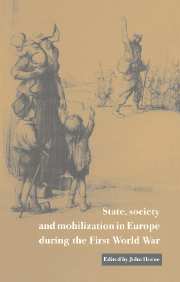Book contents
- Frontmatter
- Contents
- List of contributors
- Preface
- 1 Introduction: mobilizing for ‘total war’, 1914–1918
- I National ideals
- II Solidarities and minorities
- 5 Mobilizing labour and socialist militants in Paris during the Great War
- 6 Between integration and rejection: the Jewish community in Germany, 1914–1918
- 7 Wackes at war: Alsace-Lorraine and the failure of German national mobilization, 1914–1918
- III Army and nation
- IV The limits and consequences of mobilization
- Notes
- Index
6 - Between integration and rejection: the Jewish community in Germany, 1914–1918
Published online by Cambridge University Press: 04 December 2009
- Frontmatter
- Contents
- List of contributors
- Preface
- 1 Introduction: mobilizing for ‘total war’, 1914–1918
- I National ideals
- II Solidarities and minorities
- 5 Mobilizing labour and socialist militants in Paris during the Great War
- 6 Between integration and rejection: the Jewish community in Germany, 1914–1918
- 7 Wackes at war: Alsace-Lorraine and the failure of German national mobilization, 1914–1918
- III Army and nation
- IV The limits and consequences of mobilization
- Notes
- Index
Summary
History shows that wartime treats minorities and marginalized social groups in a paradoxical way. War often creates opportunities for integration where few had previously existed. But it can lead to even greater discrimination and alienation from the majority society. The necessity in modern wars to mobilize all social forces in the battle against the external enemy encourages a tendency towards internal cohesion, equalization of the population and ‘democratization’ of the polity. It can lead, at least temporarily, to pacification of social conflict and the inclusion of marginal groups. Minorities gain an opportunity to prove their membership in the majority society through unconditional patriotism, creating conditions for the repeal of discriminatory measures, and the fostering of integration and equal rights. On the other hand, there is the growing danger during wartime that minorities will be blamed if the war takes a negative course. Shortages on the home front often result in the persecution and exclusion of minority members from the majority society.
The form taken by the majority society's reaction to minority groups largely depends on the direction taken by the war. However, it is also affected by the previous level of integration of the minority in question, the tradition and strength of discrimination, and the extent to which the majority society is able and willing to integrate minorities. Comparative research on the situation of minorities during wartime has not yet been systematically developed. Panikos Panayi's recent work, however, provides an excellent starting-point.
- Type
- Chapter
- Information
- Publisher: Cambridge University PressPrint publication year: 1997
- 5
- Cited by

